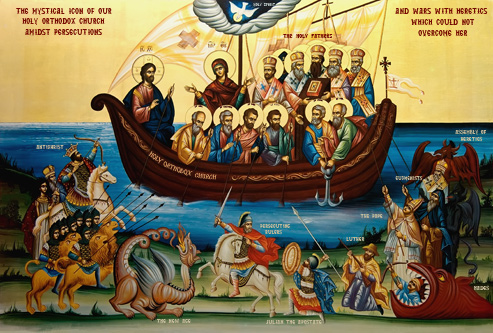You spend a fair bit of space responding to the critique offered by Peter Steinfels in his book A People Adrift, but there’s one point you mention and then let drop. He suggests, as many others have, that the American bishops are spineless when it comes to Rome – that is, constantly looking over your shoulder at how people in Rome will react. Is there any merit to that?
I don’t think so. People say that again and again. We have a very adult discussion with the Holy See, while at the same time acknowledging that the pope is our father too, and that the primacy of Peter is a datum of revelation that constitutes the church internally as well as externally. There’s great respect, but bishops will go back to the Holy See again and again if they think there’s been a mistake on the governmental level. It goes on all the time. We’re doing it now, this week. This idea that we’re all sitting around waiting to see what somebody over here in the Curia will do, whether to pat us on the back or to give us a slap on the hand … I don’t find that attitude at all, I really don’t.
I think the bishops know that, by Christ’s will, they are responsible for their churches. They’re in Catholic communion, they’re not franchises of General Motors. I think the Holy See knows that too … it’s a bureaucracy, of course, and like any bureaucracy, it’s mixed, but on the whole they know it. They expect us to come back and say, ‘This works, this doesn’t work.’ Why are they revising the Code of Canon Law? Because a bunch of bishops came back and said, ‘This doesn’t work.’ Again and again, they’ll do that.
Of course, they’ll do that slowly. Rome has its own rhythms, and sometimes it feels like we’ll all be dead before something happens. Often they can be too willing to say, ‘time will take care of this,’ when something really is urgent. That’s a cultural problem.
You don’t wake up in a cold sweat worrying about how Rome will react to whatever you say or do?
I don’t know any bishop who fits that description. There may be, but it’s certainly not the description of the conference and certainly not the description of the bishops I know. If people mean that we’re concerned to be orthodox in our teaching, then sure, yeah. But if you’re saying that the teaching is just defined by whatever the pope thinks of in the morning, no. The pope is also subservient to the gospel, as Benedict says very clearly, and to the tradition. He is a marker for it, and we look to see what he says, but because we want to be faithful to Christ, not because he says it.
There’s a concern that we are faithful to the apostolic tradition, and the pope is a marker for that to which we pay attention, obviously carefully. But mostly it’s our faith that makes us of one mind with the pope, it’s not his commands. The same thing is true for governance generally, although it’s a little different, because there’s a little more independence, also in the Code itself. Still, you want to govern in communion … the whole book is about that. There’s a concern that we govern not just in communion with the pope, but with the bishops of Brazil, for example. Not in the same way, but we’re a universal communion.
The concern for communion doesn’t mean we’re afraid of being reprimanded. The concern for truth doesn’t mean that we’re afraid of being scolded. Instead, it means that we’re Catholic.

